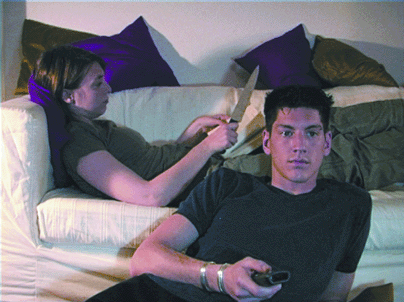“Garçon Stupide” follows one gay man’s narcissistic, clueless path
The road to self-awareness is often a rocky one. Walking that road willfully blindfolded is foolhardy. This is the way Loic leads his life in "Garcon Stupide," the feature-film debut of Swiss director Lionel Baier.
Loic (Pierre Chatagny) spends his days working a dull job at a chocolate factory, saving evenings and weekends for drunken bacchanals in the city, where a female friend, Marie (Natacha Koutchoumov), lets him crash with her.
He seems oblivious to everything that could harm him but also to the needs of others. His entire sense of self-worth is summed up in his trim, muscular frame, prominent forehead, and Roman nose.
"Garcon Stupide" opens with Loic meeting Lionel at a McDonald’s. Lionel treats him to a meal and proceeds to ask a lot of questions. The two men met on the Internet, as Loic seems to meet most men, and he is surprised to be treated like someone who might be interesting. Lionel’s questions are neither intrusive nor extraordinary, but over time, his interest starts to feel like an interrogation.
Baier takes us through some of Loic’s varied sexual encounters. Loic’s conditioning that has him believing that he is just a pretty face is made manifest as his tendency toward voyeurism that borders on the obsessive. He uses his cameraphone to document his sexual encounters, and later becomes obsessed with a soccer player (Ruie Pedro Alves) whose image appears all over the local press. Somehow Loic is able to parlay his voyeurism into a meeting with the athlete and his young daughter.
Loic is so insensitive he is almost a grown-up version of Truffaut’s "Wild Child," the boy who was raised by wolves. When he jealously lashes out at Marie for having a sexual encounter of her own—for once!—it’s clear that he expects to be the center of attention. Marie is obviously attracted to him, and he uses that to his advantage constantly, so he reacts with feral anger when her dependency on him is threatened.
Loic’s get-togethers with the older Lionel ultimately taken on a hostile quality. The younger man cannot understand why Lionel is interested in anything other than having sex with him. Yet, gradually Loic comes to the realization that he cannot remain an ignoramus his entire life, no longer finding the cold, uncomplicated world of Internet mating satisfactory.
Baier’s filming style adds to the story’s realism. Using a handheld digital video camera helps put viewers right on the scene with Loic throughout his encounters. It is not clear if the object of Baier’s social criticism is promiscuity itself, or physical pleasure-seeking that becomes mechanical and soulless, but there’s no doubt that sex has become routine for Loic, rather than remaining a spiritual wonder. Baier shows sexual situations frankly, including Loic washing his dick—in astonishing close-up—before bounding from a trick’s apartment while his host yammers on and on.
Baier shows Loic completely on his own most of the time. Even in the factory scenes, Loic lacks companionship. He spends the most time with Marie, so his indifference to her feelings is all the more startling.
Baier used unknowns for a cast. Chatagny, who himself worked in a Nestlé’s factory in a mountain town before moving to the big city to pursue his dreams, sought out Baier to cast him in a film. The fledgling actor is the film’s strongest asset. Koutchoumov as the friend whose love is not reciprocated bears a forlorn face throughout the film. Interestingly, Lionel is never seen in the film so his interactions with Loic leave the audience with the impression that they too are auditioning the young man after an Internet hook-up. With the close camera work, we are carefully examining someone who for too long lacks the wherewithal to look at himself.
gaycitynews.com



































